A CEO (Allegedly) Admitted to the Scam
PLUS: A new coalition is set to take on corporate power in New York

This is Boondoggle, the newsletter about corporations ripping off our states and cities. If you’re not currently a subscriber, please click the green button below to sign up. Thanks!
As readers here well know, a key fact about corporate tax subsidies is that they don’t actually influence corporate behavior: Research shows that nearly all of them simply pay corporate leaders to do what they would have done anyway for other reasons.
The trouble is that CEOs and executives like the make it seem like subsidies are the key factor in their decisionmaking, in order to gin up bidding wars and receive more public cash. But every now and then, they slip up.
That’s apparently what happened in Utah recently. The CEO of Domo, a tech firm, was at a confab with state legislators and allegedly admitted that he received pre-approval for $23,314,700 in subsidies meant for corporations that are threatening to move to or expand in another state, but that he never actually planned to leave.
There’s no reporting on his exact remarks, merely the fact that whatever he said was enough to get the state Office of Economic Opportunity to launch an investigation. That office runs Utah’s incentive programs and gave Domo access to funds back in January.
Here’s what a Domo spokesperson said at the time of that approval: “We really love Utah and we want to continue our growth here and contribute, and so the incentive to do that commits us to growing our jobs in Utah versus growing in other states or moving our business to other states.” That certainly sounds like a threat to leave! If the CEO admitted that it was a sham, though, the funds could be forfeit.
That it’s the economic development office itself running the investigation cuts two ways, I think: On the one hand, those offices are usually in the business of cutting as many deals as possible in order to make themselves look good and useful, so they may not want to hammer Domo too hard.
On the other, there’s actually a concerted push in Utah right now to rethink corporate incentives altogether, so the economic development folks might want to make an example of Domo in order to prove that they’re not irresponsibly throwing public money around or being incompetent, in order to save their jobs.
That a corporation lying to get incentives could lead to consequences at all, though, is too rare. In my book, I detailed how Toyota received $40 million in public funds in 2014 to consolidate several offices into one in the Dallas area, and Toyota executives then later admitted that the public funding had nothing to do with their decision, since coming to the Lone Star State made sense for several other reasons.
What happened next? Literally nothing! Toyota kept the money.
More recently, New Jersey’s big corporate subsidy investigation — the one that began with a bang and ended with a big whimper — resulted in some corporations being referred to the state regulators or law enforcement for allegedly lying on their incentive applications. And just today, New York State Sen. James Skoufis called for a criminal investigation into Medline, a corporation he alleges lied about being ready to move to another state in an attempt to access tax incentives
But those are exceptions, not the rule.
Some of the reticence to enforce those requirements has to do with bureaucratic disinterest or incompetence, sure, but it is also, for a corporation that isn’t completely mailing it in, not that hard to gin up a fake threat to leave that looks real enough. Too many locales are willing to be the stalking horse that enable public dollar extraction elsewhere.
Designing a real test that can determine which corporations would move elsewhere “but for” a particular subsidy, as the term of art goes, and which are gaming the system is really hard. As Good Jobs First, put it, a “but for” requirement is “a frequently-abused rule that is almost impossible to verify and has more to do with covering politicians' backsides than preventing needless giveaways.”
So good on Utah for investigating, but it’s still operating within the confines of a system that is never going to work for taxpayers.
SHAMELESS SELF-PROMOTION: If you missed our American Economic Liberties Project event this week on building local power to confront corporate dominance, don’t worry! You can watch the whole thing here.
I think it’s really worth it: New York State Senator Michael Gianaris explained his proposed antitrust reforms (more on that below), Washington, D.C. Attorney General Karl Racine broke down his major lawsuit against Amazon, and I hosted a great panel with Illinois State Sen. Robert Peters, Florida State Rep. Anna Eskamani, and Align Executive Director Maritza Silva-Farrell that touched on corporate secrecy, subsidies, and how communities organize to push back. Again, watch it here.
I also released a toolkit for state lawmakers who want to rein in Big Tech’s economic power. It includes policy ideas, model legislation, and how to respond to critiques from those invested in the status quo. NBC covered its release here. You can read the whole toolkit here, and please send it to your state legislators if you can. Every bit helps.
ONE MORE THING: On Wednesday, New Yorkers for a Fair Economy, a coalition pushing to pass a bill called the 21st Century Antitrust Act through the New York legislature, formally went public in front of New York City’s first Amazon bookstore. Its members include Align, New York Communities for Change, the Institute for Local Self-Reliance, the Strategic Organizing Committee, the Teamsters, and the Retail, Wholesale and Department Store Union, as well as my shop.
The 21st Century Antitrust Act, as I wrote about a bit last session when the bill got through the State Senate before stalling in the Assembly, would update New York’s antitrust law so that it actually functions as antitrust law is supposed to: To protect workers and local businesses from the predations and abusive tactics of dominant corporations. I wrote an explainer about the bill that you can read here.
I’m sure I’ll say more on this in the future when the New York legislature comes back into session, but if any folks want to know how they can help with this, let me know. Below are some photos from our launch.

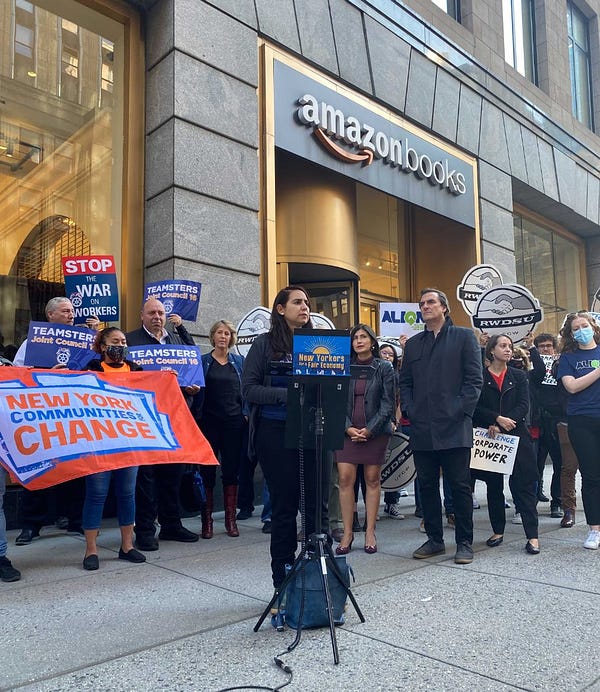
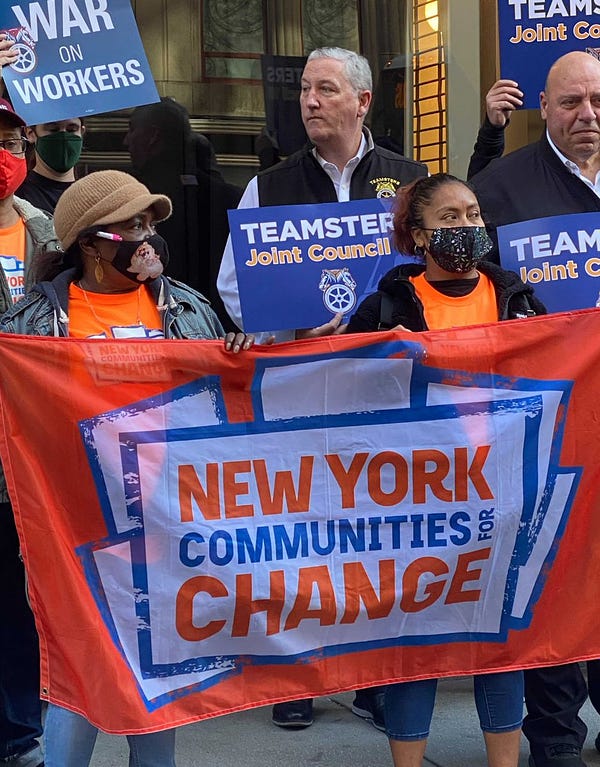

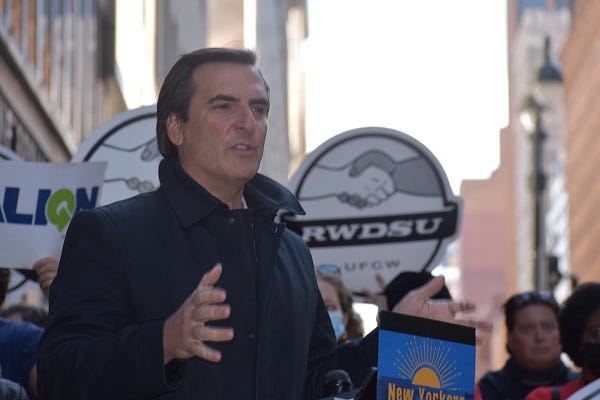

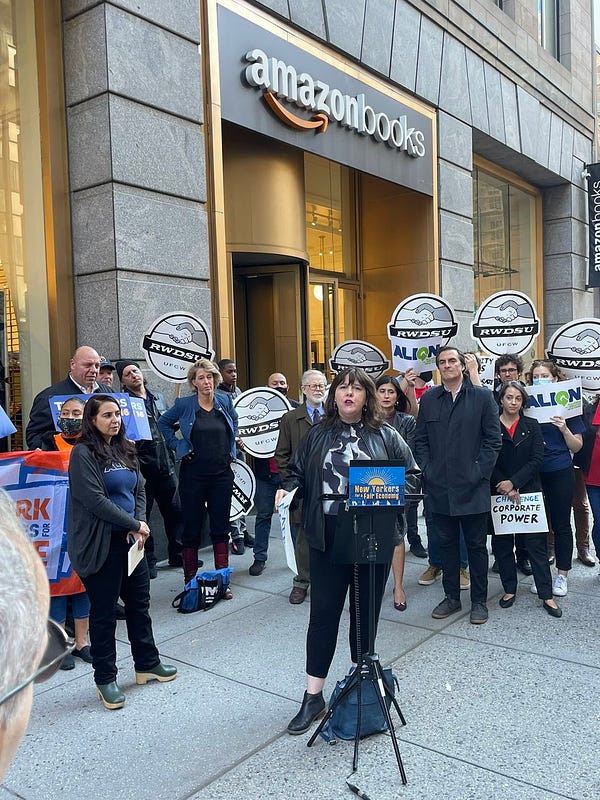

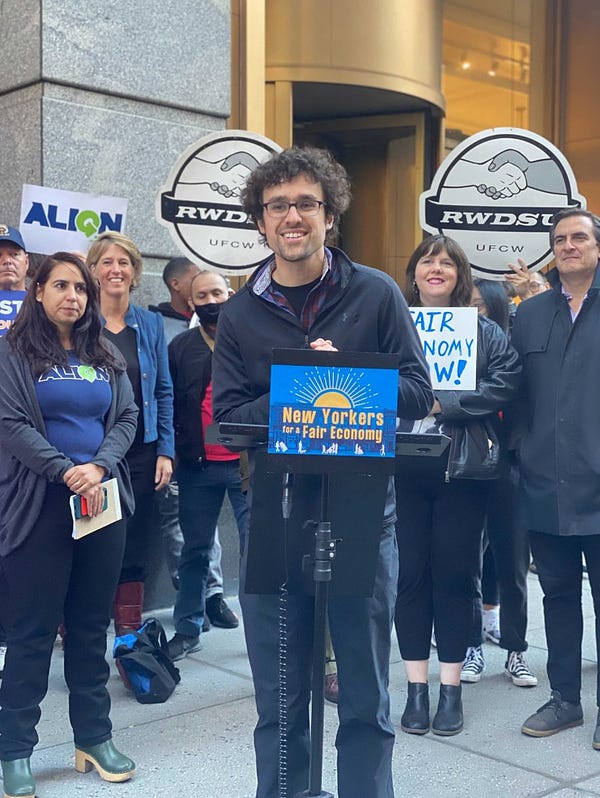
Thanks for reading this edition of Boondoggle. If you liked it, please take a moment to click the little heart under the headline or below. And forward it to friends, family, or neighbors using the green buttons. Every click and share really helps.
If you don’t subscribe already and you’d like to sign up, just click below.
Finally, if you’d like to pick up a copy of my book, The Billionaire Boondoggle: How Our Politicians Let Corporations and Bigwigs Steal Our Money and Jobs, go here.
Thanks again!
— Pat Garofalo


